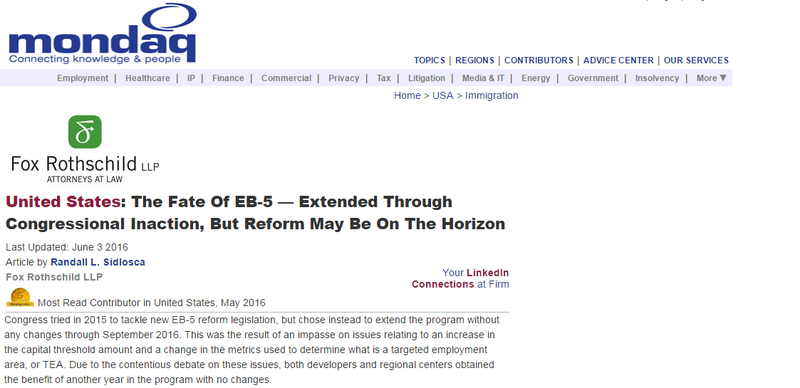The Fate Of EB-5 — Extended Through Congressional Inaction, But Reform May Be On The Horizon
Congress tried in 2015 to tackle new EB-5 reform legislation, but chose instead to extend the program without any changes through September 2016. This was the result of an impasse on issues relating to an increase in the capital threshold amount and a change in the metrics used to determine what is a targeted employment area, or TEA. Due to the contentious debate on these issues, both developers and regional centers obtained the benefit of another year in the program with no changes.
What will happen this year is anyone's guess. What we do know is that Congress is holding hearings on EB-5 reform, providing an opportunity for individuals in the EB-5 industry to voice their opinion as to the future of the program.
On April 13, 2016, the Senate Judiciary Committee held its second hearing this year on the EB-5 Program titled, "The Distortion of EB-5 Targeted Employment Areas: Time to End the Abuse." Among the witnesses was Peter Joseph, the Executive Director of Invest in the USA, the national nonprofit trade association representing EB-5 developers, regional centers and other professionals that are in the EB-5 space.
In his testimony, Joseph made recommendations for several critical reforms the Committee should consider in the long-term reauthorization of the EB-5 legislation.
Those recommendations include:
- Increase visa capacity to enhance economic impact of EB-5 and address the backlog of investors currently waiting for visas to be available.
- Staff commercially viable processing system at USCIS that addresses existing backlogs and prioritizes predictability and length of processing times for EB-5 related petitions and applications.
- Avoid retroactive application of new law and reform to protect the existing EB-5 investors and their families and the billions of dollars in financial commitments and contractual obligations.
- Ensure all EB-5 investors with petitions currently filed, or at a later stage in the EB-5 process, are guaranteed adjudication (not approval) and eligibility for immigration benefits throughout the entire EB-5 process (I-526 petition, EB-5 visa issuance, and I-829 petition) regardless of future reforms, lapses, or expiration of the program.
- Continue to allow economic impact models including indirect/induced job creation to count for EB-5 purposes (using the same econometric models that are generally accepted as economic policymaking tools by government, academia, and business).
- Improve program integrity, including through enhanced oversight and reporting requirements of Regional Centers that are not unduly burdensome, such as site visits funded by user fees.
- Clarify geographic (including TEAs), structural, and industry project characteristics that enable consistent adjudication of EB-5 petitions and applications.
These recommendations mirror the position that most in the EB-5 industry have taken on EB-5 reform. The program has largely been a success with a substantial amount of foreign capital being invested in job-creating projects in the United States. Many in the EB-5 space would like to see an extension of the EB-5 legislation for at least a five-year period.
Since 2008, the program's annual contribution to foreign direct investment inbound into the
United States grew by more than 1,200 percent to total almost $5 billion in fiscal year 2015 alone. This investment capital is creating tens of thousands of jobs for U.S. workers in diverse communities by funding projects in a wide variety of industry sectors across the country.
Will Congress take any action this year to reform the current EB-5 legislation? I believe not.
This is a Presidential election year. It is very likely that Congress will defer on making any substantive changes to the EB-5 program until 2017. Immigration reform legislation has never passed both houses of Congress in an election year.
The economic benefits of the EB-5 program are not in dispute. The major issue that Congress needs to address is improving the compliance provisions in the legislation. This will provide transparency to the program — something that is very much needed.
Mentions
States
- Florida
Securities Disclaimer
This website is for informational purposes only and does not constitute an offer or solicitation to sell shares or securities. Any such offer or solicitation will be made only by means of an investment's confidential Offering Memorandum and in accordance with the terms of all applicable securities and other laws. This website does not constitute or form part of, and should not be construed as, any offer for sale or subscription of, or any invitation to offer to buy or subscribe for, any securities, nor should it or any part of it form the basis of, or be relied on in any connection with, any contract or commitment whatsoever. EB5Projects.com LLC and its affiliates expressly disclaim any and all responsibility for any direct or consequential loss or damage of any kind whatsoever arising directly or indirectly from: (i) reliance on any information contained in the website, (ii) any error, omission or inaccuracy in any such information or (iii) any action resulting therefrom.




